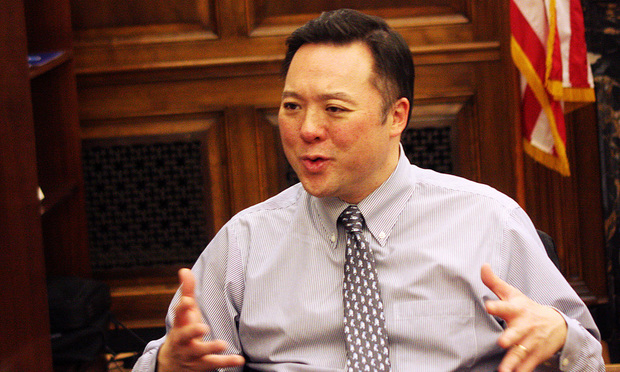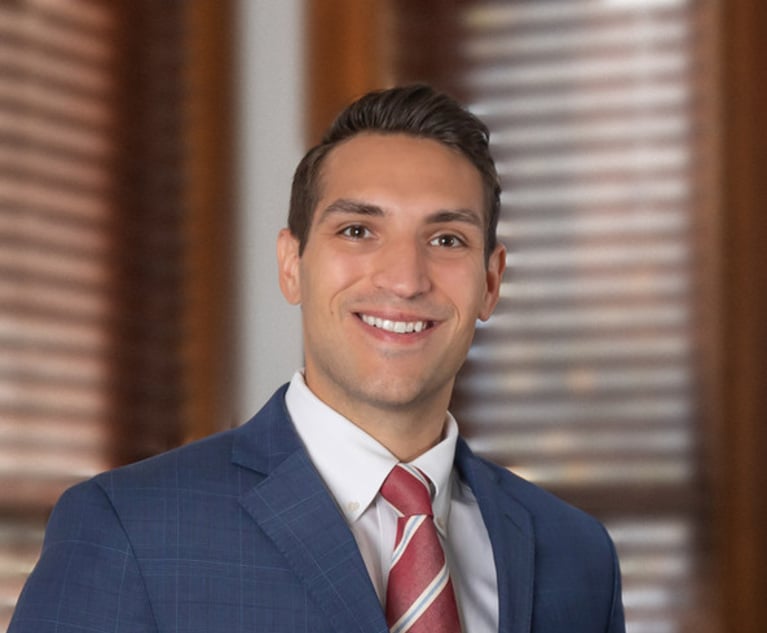AG Tong: Purdue Pharma 'Poured Gasoline on the Fire' of Opioid Epidemic
Connecticut Attorney General William Tong spoke one-on-one this week with the Connecticut Law Tribune about the latest lawsuit filed by his office: an amended complaint against Purdue Pharma and its owners over opioid abuse.
April 25, 2019 at 01:18 PM
5 minute read
 Connecticut Attorney General William Tong in his Hartford office in February. Photo by Michael Marciano/ALM
Connecticut Attorney General William Tong in his Hartford office in February. Photo by Michael Marciano/ALM
Connecticut Attorney General William Tong has spent the week talking about his shock and anger at what he sees as Purdue Pharma's alleged abuse of the public trust, while also meeting with families affected by the opioid epidemic.
Tong's office filed an amended 62-page lawsuit Monday against Purdue and individual members of the Sackler family, who own the company, related to the alleged fraudulent transfer of funds from the Stamford-based corporation.
In a wide-ranging phone interview with the Connecticut Law Tribune Tuesday, Tong, whose campaign for attorney general outlined plans to litigate against Big Pharma over its marketing of opioids, discussed the reasoning behind the amended and expanded suit and what he hopes to accomplish.
“This is some of the more shocking conduct I've seen, and frankly, to borrow a phrase from the U.S. Supreme Court, it shocks the conscience,” Tong said. He said Purdue's marketing of opioids was misleading at best, and said the Sackler family should be held morally responsible.
Following an investigation in 2007, several Purdue executives—but not former chairman and president Richard Sackler, who is a defendant in the Tong suit—pleaded guilty to charges they misled the public about the risks of OxyContin, which the company makes.
A representative for Richard Sackler issued a statement Thursday to the Connecticut Law Tribune, calling Tong's comments and allegations “provably false.”
“Purdue led the pharmaceutical industry in taking concrete actions to help prevent drug addiction and save lives, with more than 65 initiatives at a cost of more than $1.5 billion. At no time was any money improperly transferred from the company,” the statement read. “Dr. Richard Sackler has repeatedly apologized for using insensitive language in email with friends nearly 20 years ago during moments of frustration about reports of illicit activity involving prescription opioids, as those comments do not reflect how he truly feels or ever actually acted. Headline-seeking lawsuits that mischaracterize emails do not change the facts, nor does it save lives in Connecticut, whose people are looking to their leaders for results, not a repackaged lawsuit.”
Purdue, for its parts, called the state's amended lawsuit ”part of a continuing effort to try these cases through the media, rather than the justice system.”
“We believe that no pharmaceutical manufacturer has done more to address the opioid addiction crisis than Purdue, and we continue to work closely with governments and law enforcement agencies on this difficult social issue,” the company said.
The statement also said the company “will continue to defend itself in litigation and continue to fight for balance in the public discourse so that society can simultaneously help pain patients in need and create real solutions to the complex problem of addiction.”
But Tong alleged Purdue has known since at least 2007 about misleading advertising and marketing campaigns related to its products. He said the company never properly addressed the issue, and made matters worse.
“It wasn't just that they made opioids or sold opioids aggressively, or that opioids are a key part of the addiction crisis,” Tong said. “What is really shocking is that knowing all of these facts, Purdue Pharma poured gasoline on the fire.”
The amended complaint alleges the Sackler family also acted improperly.
“The Sacklers continued to vote to have Purdue pay them significant distributions, and send money to offshore companies,” the complaint alleges. “And Purdue continued to forecast hundreds of millions of distributions to Purdue's profits to the Sacklers.”
The lawsuit also says “Purdue, at the direction of the Sacklers, fraudulently conveyed hundreds of millions of dollars of Purdue's profits from opioids to the Sacklers each year during the actionable period, despite Purdue's and the Sacklers' knowledge that they faced certain and significant liabilities because of the multitude of litigation against Purdue, including Connecticut.”
The suit continues: “The Sacklers gave no regard to Purdue's ability to pay creditors like Connecticut, or even negotiate a settlement in good faith, given the hundreds of millions of dollars each year hidden away by distributing those funds to the Sacklers.”
Tong said the facts are on the state's side.
“We want to get to trial as soon as we can so we can put on our very strong evidence to show the defendants are responsible and should be held accountable for their role in the opioid crisis,” Tong said. “Our evidence is very strong. We are talking about emails and documents about their marketing techniques.”
The opioid crisis, the attorney general said, resulted in “tens of billions of dollars a year in costs to our state and more than 1,000 people died in 2018.” The Office of the Medical Examiner reported more than 1,000 deaths last year in Connecticut due to accidental drug overdoses, with the vast majority being opioid-related.
The named individual defendants are brothers Richard and Jonathan Sackler. Both are former members of Purdue's board of directors and are the sons of Raymond Sackler, co-founder of Purdue. Also named as defendants are former board of director members Mortimer Sackler, Kathe Sackler, Ilene Sackler Lefcourt, Beverly Sackler, David Sackler, Theresa Sackler, Cecil Pickett, Paulo Costa, Ralph Snyderman, Frank Peter Boer and Judith Lewent; as well as John Stewart, CEO from 2007 to 2013; and Mark Timney, CEO from 2014 to 2017. Russell Gasdia, vice president of sales and marketing from 2001 to 2014, was named as a defendant after the lawsuit was filed.
Read More:
AG's Lawsuit Alleges Fraudulent Transfers by Purdue Pharma and Sackler Family During Opioid Crisis
This content has been archived. It is available through our partners, LexisNexis® and Bloomberg Law.
To view this content, please continue to their sites.
Not a Lexis Subscriber?
Subscribe Now
Not a Bloomberg Law Subscriber?
Subscribe Now
NOT FOR REPRINT
© 2025 ALM Global, LLC, All Rights Reserved. Request academic re-use from www.copyright.com. All other uses, submit a request to [email protected]. For more information visit Asset & Logo Licensing.
You Might Like
View All

Apple Disputes 'Efforts to Manufacture' Imaging Sensor Claims Against iPhone 15 Technology
Trending Stories
- 1SDNY Criminal Division Deputy Chief Returns to Debevoise
- 2Brownstein Adds Former Interior Secretary, Offering 'Strategic Counsel' During New Trump Term
- 3Tragedy on I-95: Florida Lawsuit Against Horizon Freight System Could Set New Precedent in Crash Cases
- 4Weil, Loading Up on More Regulatory Talent, Adds SEC Asset Management Co-Chief
- 5Big Banks Did Great Last Year. What Does That Mean for Big Law?
Who Got The Work
J. Brugh Lower of Gibbons has entered an appearance for industrial equipment supplier Devco Corporation in a pending trademark infringement lawsuit. The suit, accusing the defendant of selling knock-off Graco products, was filed Dec. 18 in New Jersey District Court by Rivkin Radler on behalf of Graco Inc. and Graco Minnesota. The case, assigned to U.S. District Judge Zahid N. Quraishi, is 3:24-cv-11294, Graco Inc. et al v. Devco Corporation.
Who Got The Work
Rebecca Maller-Stein and Kent A. Yalowitz of Arnold & Porter Kaye Scholer have entered their appearances for Hanaco Venture Capital and its executives, Lior Prosor and David Frankel, in a pending securities lawsuit. The action, filed on Dec. 24 in New York Southern District Court by Zell, Aron & Co. on behalf of Goldeneye Advisors, accuses the defendants of negligently and fraudulently managing the plaintiff's $1 million investment. The case, assigned to U.S. District Judge Vernon S. Broderick, is 1:24-cv-09918, Goldeneye Advisors, LLC v. Hanaco Venture Capital, Ltd. et al.
Who Got The Work
Attorneys from A&O Shearman has stepped in as defense counsel for Toronto-Dominion Bank and other defendants in a pending securities class action. The suit, filed Dec. 11 in New York Southern District Court by Bleichmar Fonti & Auld, accuses the defendants of concealing the bank's 'pervasive' deficiencies in regards to its compliance with the Bank Secrecy Act and the quality of its anti-money laundering controls. The case, assigned to U.S. District Judge Arun Subramanian, is 1:24-cv-09445, Gonzalez v. The Toronto-Dominion Bank et al.
Who Got The Work
Crown Castle International, a Pennsylvania company providing shared communications infrastructure, has turned to Luke D. Wolf of Gordon Rees Scully Mansukhani to fend off a pending breach-of-contract lawsuit. The court action, filed Nov. 25 in Michigan Eastern District Court by Hooper Hathaway PC on behalf of The Town Residences LLC, accuses Crown Castle of failing to transfer approximately $30,000 in utility payments from T-Mobile in breach of a roof-top lease and assignment agreement. The case, assigned to U.S. District Judge Susan K. Declercq, is 2:24-cv-13131, The Town Residences LLC v. T-Mobile US, Inc. et al.
Who Got The Work
Wilfred P. Coronato and Daniel M. Schwartz of McCarter & English have stepped in as defense counsel to Electrolux Home Products Inc. in a pending product liability lawsuit. The court action, filed Nov. 26 in New York Eastern District Court by Poulos Lopiccolo PC and Nagel Rice LLP on behalf of David Stern, alleges that the defendant's refrigerators’ drawers and shelving repeatedly break and fall apart within months after purchase. The case, assigned to U.S. District Judge Joan M. Azrack, is 2:24-cv-08204, Stern v. Electrolux Home Products, Inc.
Featured Firms
Law Offices of Gary Martin Hays & Associates, P.C.
(470) 294-1674
Law Offices of Mark E. Salomone
(857) 444-6468
Smith & Hassler
(713) 739-1250












